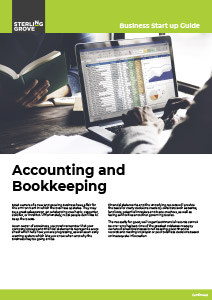How to Start
Accounting and Bookkeeping
Business Start Up Guide – Part 3
This guide covers the following areas:
- Basic Bookkeeping
- Cash or accrual accounting
- Accounting records and record keeping
- Making Tax Digital (MTD)
- Accounting software systems
- Internal Control
Most owners of a new and growing business have a flair for the environment in which the business operates. They may be a great salesperson, an outstanding mechanic, carpenter, solicitor, or inventor.
Unfortunately, most people don’t like to keep the books. As an owner of a business, you must remember that your company’s books and financial statements represent a score sheet which tells how you are progressing, as well as an early warning system which lets you know when and why the business may be going amiss.
Financial statements and the underlying records will provide the basis for many decisions made by outsiders such as banks, landlords, potential investors and trade creditors, as well as taxing authorities and other governing bodies. The necessity for good, well-organised financial records cannot be over-emphasised. One of the greatest mistakes made by owners of small businesses is not keeping good financial records and making improper or poor business decisions based on inadequate information.
Keep it Simple
Quality financial information does not necessarily translate into complicated bookkeeping or accounting systems. Far too often owners of businesses become overwhelmed by their accounting system to the point where it is of no use to them. An accounting or book-keeping system is like any tool used in your business; it needs to be sophisticated enough to provide the information you need to run your business and simple enough for you to run it (or supervise the bookkeeper). Questions you should ask in developing an accounting and financial reporting system are:
1. Who will be the users of the financial information?
2. What questions do I need answered to manage the business?
3. What questions should be answered for HMRC authorities?
It should be noted that HMRC are increasingly making Business Records Checks of those businesses they reckon could have poor records.
As your business grows, you should work closely with your accountant to ensure that your accounting system is providing you with appropriate information.
The Government proposes to require businesses to submit accounts information to HMRC quarterly as part of the “Making Tax Digital” project. This was planned to start in 2018 but has now been deferred apart from VAT reporting. You should therefore consider a computerised accounting package from the outset that enables you to comply with these new obligations.
Cash or Accrual Accounting
One of the decisions to be made as you start a business is whether to keep your records on a cash or accrual basis of accounting. The cash basis of accounting has the advantage of simplicity and almost everyone understands it. Under the cash basis of accounting, you record sales when you receive the money and account for expenses when you pay the bills. The increase in the money in “the cigar box” at the end of the month is how much you have made.
Sole trader or partnership businesses may choose to report their profits on a cash basis for tax purposes if their annual turnover is below £150,000. (This threshold was previously linked to the VAT registration limit)
Unfortunately, as we all know, the business world is not always so easy. Sales are made to customers and you sometimes must extend credit. Your business will incur liabilities which are due even though you may not have received the invoice or have the cash available to pay them. Most users of financial statements such as bankers and investors are used to accrual-basis statements and expect to see them. Once you become familiar with them, they provide a much better measuring device for your business operations than cash-basis statements.
Whether you use the cash or accrual basis, it is possible to keep books for income tax purposes on a different basis than for financial statements. It may be more advantageous (less tax) for you to do so.
Accounting Records and Record Keeping
Another question that the owner of a business must answer is “Who will keep the books of the business?” Will you do it yourself, will the receptionist or a secretary double as a part-time bookkeeper, will you have a bookkeeper that comes in periodically, or will the volume of activity be such that a full-time bookkeeper will be required?
Very often the owners of a business decide to keep the books themselves and underestimate the commitment they have made to other phases of the operation and the time required to maintain a good set of financial records and books of account. Consequently, the record keeping is often low priority and must be caught up later.
This approach, though rarely planned, can require a substantial expenditure of time and money. While it is important for the owners of a business to maintain control and stay involved in the financial operations of the enterprise, this can be achieved by maintaining close control over the cheque-signing function and scrutinising certain records.
We can help develop a good programme of record-keeping duties for you, your employees and any outside book-keepers you may engage.
Making Tax Digital (MTD)
Self-employed businesses and landlords with annual business or property income above £10,000 will need to follow the rules for MTD for Income Tax from their next accounting period starting on or after 6 April 2023. Thus if the business is already MTD compliant for VAT they will also be compliant for income tax. The start date for MTD for corporation tax has yet to be confirmed.
A Word about Accounting Software Systems
There are a number of very good and easy to use accounting software systems which are commercially available, but none of them will solve the problems of inaccurate or poor-quality financial records. All they will do is generate bad information faster. This is one of the reasons that the computer has also probably caused more headaches for the owners of modern businesses than any other single cause.
If you want to use a computer-based accounting package, either in your own business, with a service bureau, or through your accountant, it is imperative that you generate accurate information to be entered into the system.
The real value of accounting software becomes apparent once it is running smoothly in your business. Your accountant can then function in the capacity for which he was trained, not as a “number cruncher”, but as your business adviser, consultant and strategist.
Both of you can focus not on producing reports for various regulatory agencies but on analysing your business to make it more profitable.
Internal Control
What is internal control? It is the system of checks and balances within a business enterprise that helps to ensure that the company’s assets are properly safeguarded, and that the financial information produced by the company is accurate and reliable. When you are operating as a “one-man shop”, or at least handling all the company’s financial transactions, maintaining good internal accounting control is relatively straightforward. However, when your company grows to the size where you must delegate some of the functions, it becomes more difficult to ensure that all the transactions are being accounted for properly.
No matter the size of your business, you should always be able to answer “YES” to the following questions:
1. When my company provides goods or services to our customers, am I sure that the sale is recorded and either the debt is recorded in accounts receivable or the cash is collected?
2. When cash is spent by my company am I sure we received goods or services?
The method used to ensure that these two questions can be answered affirmatively will be widely varied. They are essential stepping-stones to maintaining good control in your business. The solution in your particular instance may be as simple as numbering the sales tickets and being sure ALL TICKETS ARE ACCOUNTED FOR or reviewing all invoices and timecards before signing company cheques.
These are fundamentals in a well-run business. As the company grows you will need to consider concepts such as segregation of authority or controlled access storerooms. No matter what the size of your enterprise, you should consider controlling your business and safeguarding hard earned assets as a priority from the outset.
Contact us today to discuss how we can help you put together a road map that will keep your business on course for growth and success.

